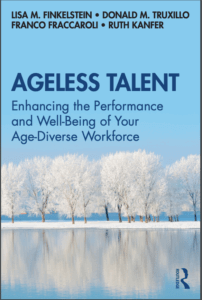DeKalb, Ill. – Age discrimination, or ageism, affects all workers – young and old. Psychology professor Lisa Finkelstein witnessed how it affected her father and has been studying its impacts for nearly three decades.
“I was just starting my Ph.D program in industrial/organizational psychology at Tulane University in the early 90s and my dad, who was in his 60s and had some health issues, lost his job and was having a really hard time getting hired.”
Her father, who was in sales, did not find work. He eventually ended up starting his own business before retiring.
“There’s often a personal connection to research topics in psychology, and that was mine,” she recalled. “At the time, there wasn’t a lot of research done on aging issues at work.”
Finkelstein’s research has expanded the knowledge base of how aging affects the workplace.
Over the course of three decades, she earned her Ph.D and published more than 25 papers, nine book chapters, two books, and a few blogs on aging and work issues.
“I began working in this area when I was about 23 years old, and now I’m almost 53. Depending on who you ask, I am either approaching or firmly in the older-worker category.”
Her second book, “Ageless Talent: Enhancing the Performance and Well-Being of Your Age-Diverse Workforce,” is a practical guide for organizational leaders, managers and supervisors interested in developing and managing an aging and age-diverse talent pool.
The book provides an easy-to-implement set of tools for addressing modern management challenges arising across the globe and offers suggestions for leaders interested in short-term and long-term change. The tactics, grounded in time-tested and leading-edge research, include step-by-step guides that can be easily customized to different organizations and industries.
The book is a collaborative effort between researchers in Europe and the United States. Finkelstein, together with Donald Truxillo, Franco Fraccaroli and Ruth Kanfer, brings different areas expertise together to provide a global perspective.
The concept for a practical guide came out of a congressional briefing in May 2015.
In May 2015, Kanfer and Finkelstein were part of a team delivering a Congressional Briefing on the aging workforce on behalf of the Society for Industrial and Organizational Psychology (SIOP). The first book by the four collaborators, featuring their research on age discrimination, had just come out shortly before, so congressional aides who had attended the briefing were given a copy.
“Ruth and I kind of looked at each other and said, ‘Are any of them going to want to read that academic book?’
“We decided to ‘get the band back together’ and write a short, practice-focused book that was science-based but accessible, digestible and useful to a broader audience,” Finkelstein said.
Long before COVID-19 turned the world of work on its ear, the workplace was challenging – longer hours, automation, the need to reskill workers due to technological advances, cultural, economic and demographic shifts and communication challenges brought on by having five generations in the workforce.
“The pandemic exacerbated a lot of challenges facing workers of all ages,” Finkelstein said.
Finkelstein’s specialization in age stereotypes and age discrimination uncovers important truths on how employees develop.

Workers change and evolve over time. Some changes that come with age are challenges and some are opportunities. We know that physical and cognitive decline eventually will happen with age, although the rate varies vastly among people. Other changes that happen with age are positive, such as workers developing experience and wisdom and often becoming better at emotional regulation.
The passage of time affects people in different ways and at different rates. People vary in personality, physical and mental abilities, interests, preferences and lifestyles. This is true for any age group.
“Productivity and performance are not tied to age,” Finkelstein added. “People’s motivation and levels of engagement might change over time for many different reasons, and it may not be linear.”
Age should be a factor when developing inclusive workspaces. Age is one of the differences we have among us. As organizations look at building a strong culture of diversity and inclusion, they should not ignore their age diversity culture. It is important that people of all ages are having their voices heard and feeling like valued members of their teams.
Generational stereotypes such as Boomers, Gen X, Millennial and Gen Z are fueling discrimination. “The media is in love with the shorthand of generations and has been promoting generational stereotypes in really pervasive and I believe dangerous ways,” Finkelstein said. “It has created an us-versus-them mentality. Expression of these stereotypes is not looked down upon in the same way as other types of stereotypes.”
“This might be one of the biggest challenges managers face in an age-diverse workforce – trying to get people to recognize that people from different generations are not actually from different planets.
“We encourage managers to get to know the individual people on their teams – their skills, preferences, talents, etc. – to see how they can best support and nurture their employees of any age as they develop and change over time and across career stages,” she added.
Remote work presents opportunities and challenges for workers of all ages. According to Finkelstein, the biggest challenge may be overcoming the biases that come with age and generational stereotyping. The “older workers can’t handle technology” stereotype is one of the most pervasive in our culture. Remote work often requires the use of new technology, and to some extent, older workers have bought into this stereotype.
“There may be some feelings of fear and threat around the introduction of new technology,” she said.
“Utilizing research on training and age to help design training methods that build confidence for everyone and offer sound approaches to skill-building can be helpful to ease those fears,” she added.
The book, which was started three years ago, does not ignore the impacts of the pandemic. Finkelstein said it wasn’t meant to be a COVID-19 book, even though it was completed in the middle of the pandemic.
“We delayed the book three different times, once when one of our co-authors was hospitalized with COVID-19 and recovered,” she said.
The authors added timely updates in various chapters and referenced the impacts of the pandemic in the preface. But, according to Finkelstein, it is too early to gauge the long- and short-term impacts the pandemic will have on the workplace.
“It’s my hope that the book raises awareness that the aging and age-diverse workforce is something that must be attended to for organizations to be as successful as they can be,” Finkelstein said. “We want to encourage organizations to have a proactive approach and create age-friendly practices and an age-friendly climate for all workers to grow and develop and continue to make essential contributions to their workplace throughout their lives.”
Media Contact: Paula Meyer
About NIU
Northern Illinois University is a student-centered, nationally recognized public research university, with expertise that benefits its region and spans the globe in a wide variety of fields, including the sciences, humanities, arts, business, engineering, education, health and law. Through its main campus in DeKalb, Illinois, and education centers for students and working professionals in Chicago, Hoffman Estates, Naperville, Oregon and Rockford, NIU offers more than 100 areas of study while serving a diverse and international student body.


